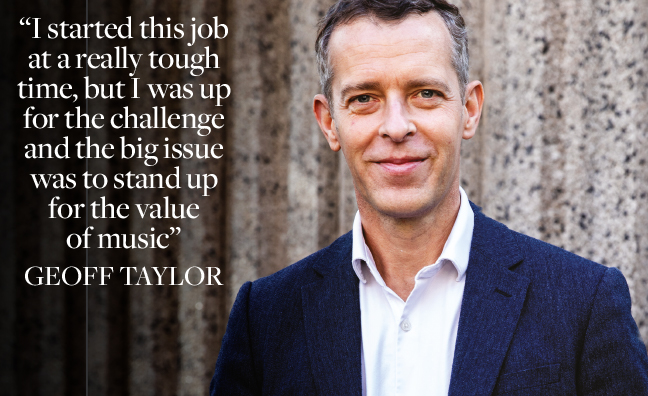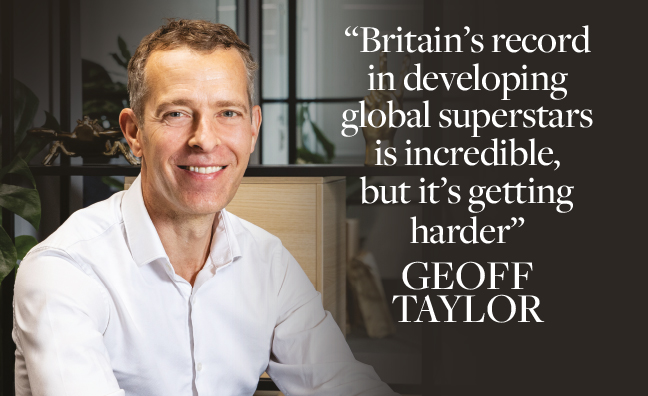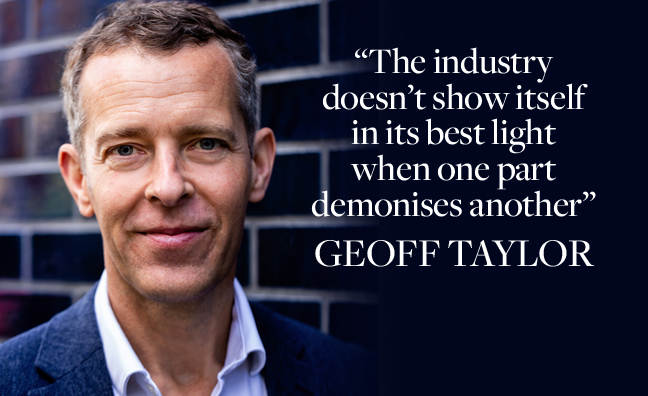Geoff Taylor’s departure from the BPI at the beginning of 2023 will signal the end of an era for the UK music industry. Over his near 16-year tenure, the former lawyer has worked to stamp out piracy, overseen the not inconsiderable fallout from the streaming revolution, steered the BRITs and dealt with all manner of political upheaval. It’s no exaggeration to say that our business would not be what it is without him. So, to mark the end of his stewardship, Music Week meets the executive to reflect, reveal the secrets of his musical past and ask what’s next…
WORDS: ANDRE PAINE PHOTOS: LOUISE HAYWOOD-SCHIEFER
When you’re the head of a music industry trade body like the BPI, there are the serious policy issues to grapple with on a daily basis, but then there’s the “fun stuff”, as outgoing CEO Geoff Taylor likes to call it. So, before we get to the nitty-gritty of streaming, piracy and exports – all key challenges during the chief exec’s tenure – here’s a highlight from his time overseeing the BRIT Awards.
“One of my favourite moments was introducing Ed Vaizey, who was then the Culture Minister, to Robbie Williams,” smiles Taylor in anticipation of his own anecdote. “We were backstage at the BRITs with help from [Universal Music UK CEO & chairman] David Joseph, Ed had all these officials around him and Robbie had his whole team, they came together like two waves and stood staring at each other. Robbie said, ‘So who are you then?’, and Ed Vaizey bristled slightly and said, ‘Well, I’m the Minister for Pop.’ Robbie looked at him and said, ‘No, I’m the Minister for Pop.’ It was absolutely brilliant.”
During our wide-ranging hour-long call (conducted from his home, while the family cat roams in the background), Taylor stresses that he’s generally busy working on making sure the BRITs runs smoothly rather than hobnobbing with the stars.
“I’ve always been very conscious that the last person that the artists want to talk to is me,” he admits.
There have been many friendly BRITs encounters, though, such as with Coldplay’s Chris Martin, at the time a neighbour in Belsize Park. But during a decade-and-a-half of steering the event, which has seen mishaps such as Madonna taking a tumble in 2015 and Adele being cut off mid-speech in 2012, Taylor’s also had to handle the fall-out when things didn’t go to plan for superstar acts.
“Oh, yeah, it’s part of my job to get yelled at!” he laughs.
Not one for the shouty style himself, the BPI, BRITs & Mercury Prize boss is more like an urbane, analytical lawyer – not surprising as law is his former profession, including a spell as general counsel and EVP at IFPI, the international record industry association.
Since his appointment in March 2007 – seven PMs ago, when Tony Blair was still running the country – Taylor has become battle-hardened from tackling an array of complex issues. The BPI has been the consistent voice for labels on subjects ranging from piracy, copyright term extension and the successful campaign to save BBC Radio 6 Music in the early days of his tenure. More recent debates have included streaming remuneration, the value gap in relation to online platforms and the challenges posed by Brexit, the pandemic and increasing diversity both in the industry and at the BRITs.
“We still have work to do to make the industry as inclusive and diverse as it should be,” says Taylor. “We’re working on sustainability too. It’s very important the industry looks at all these factors and behaves in a responsible way.”
For the first half of his period in charge, the agenda was more focused on bringing about recovery as global recorded music was battling piracy. Even today, the UK music market has still not returned to its noughties revenue peak if inflation is factored in.
“It was a really tough time for the industry,” says Taylor of his start at the BPI. “We’d started what became 10 years of decline, labels were having to cut their staff pretty significantly. But I was very much up for the challenge. It felt to me like the big issue was to stand up for the value of music and that music couldn’t just be taken for free. It had to be paid for, because it had value, and artists deserved to be paid for what they create.”
While there were flagrant cases of illegal sharing of music, the BPI was also bearing down on the role of search engines, internet service providers and social media networks in facilitating piracy. A billion notices were registered to remove illegal content from search results.
“We built a whole operation to do that,” said Taylor. “With piracy, you have to fight it on multiple fronts.”
If that feels like old industry history, Taylor points out that pushing piracy to the margins created the space for new, licensed services such as a certain Swedish tech start-up called Spotify, which launched in 2009 in the UK.
The BPI boss might have played a role in the current catalogue boom, too. In 2013, the long-running debate on copyright term extension for artist recordings was concluded with an increase from 50 years to 70 years.
“It’s really important because you’re talking about the revenues from catalogue that support new investment – The Beatles’ [music] was going to fall out of copyright,” he says.
The work in support of artists and labels has seen the BPI take over responsibility for the Mercury Prize and launch National Album Day in partnership with ERA, alongside the more commercial music focus of the BRITs.
Taylor namechecks BPI colleagues including longstanding director of events & charities Maggie Crowe, communications director Gennaro Castaldo, general counsel Kiaron Whitehead, director of public affairs Sophie Jones and COO MJ Olaore.
“I’ve been very lucky to work with a really professional, committed team of people,” he tells Music Week.
Days after our interview, Taylor is back in front of the DCMS Committee for a follow-up hearing on the economics of streaming. During the 90-minute session, he was upbraided by chairman Julian Knight, who suggested he was deviating from questions. However, that was tame compared to some of the aggressive questioning of major label executives during the 2021 committee hearings.
“I’m perfectly prepared to say that they play to the gallery in the context of the select committee,” says Taylor of the parliamentarians. “It is a highly political process.”
Significantly, however, the Competitions & Market Authority’s final report did not back the MPs’ call for a “streaming reset”. At last month’s session, Taylor defended the role of record companies in supporting artists, highlighted A&R investment and resisted calls for regulation.
While some industry figures took to social media during the streaming debate, Taylor focused on trying to win the arguments in the corridors of power. But he is quick to disabuse anyone of the idea that he’s just been reeling off lines from a policy brief for 15 years.
“This has been my passion,” says Taylor. “I started out at a music school when I was seven years old. I was at St Paul’s Cathedral and did lots of recordings, I ran a recording studio [while at university]. So music has been my whole life.
“If this is all I’ve talked about, it’s because it’s the thing I care most about. Doing this job when you have to go in for the 25th time to the DCMS and make the same arguments and fight apathy and resistance, it’s been easy for me because I am completely passionate about what we say.”
Taylor reveals that during his spell as head chorister at St Paul’s Cathedral, he got to sing at the wedding of Charles and Diana in 1981. He’s sheepish about his formative years as a choirboy, but it did set him on the path to running a music industry trade body.
“While I was there we did recordings at Abbey Road with George Martin and Paul McCartney, which gave me a bit of a taste for it,” he recalls. “So when I was a lawyer, I was just looking for a way to get into the music industry.”
Although he had several years of classical music education, Taylor now limits himself to recording “cheesy, ’80s-inspired ballads” for his own amusement.
Despite his many industry connections, a recording career seems unlikely at this point. Taylor is weighing up new opportunities as he prepares to step down from the BPI early next year.

Here, he reflects on the scale of industry evolution, his role in the debate on streaming remuneration and his next industry challenge…
Why did you decide now was the right time to leave the BPI?
“Well, you start thinking about your career and I didn’t want the BPI to be it for me. I’ve learned quite a lot about the business and I know quite a lot of people around the world now. The business has kept on changing at a rapid rate and that has kept it really interesting. I’d like to use that [knowledge] in a more commercial environment than you can in a trade body.”
Do you feel that your arguments about streaming on behalf of labels won over the regulator?
“It’s been a fairly intense period, we’ve had to work very hard. Hopefully, we’ve made a good contribution to the debate by, firstly, adding a bit more evidence when there was a lot of anecdote and emotion, but also reminding people of the value that labels bring to the music ecosystem. A lot of what’s come out in the streaming debate has reflected some of what we’ve been saying from the beginning. The issues are not all about artists’ contracts, it’s actually more fundamental to the streaming economy and the fact that there is so much music available. That is the greatest challenge for all of us when it comes to streaming.”
Was there an actual turning point for the UK in terms of labels embracing the streaming consumption model?
“The industry doesn’t get enough credit for decisions that it took, which were quite tough decisions to back a new business model that clearly was going to cannibalise existing models – CD and downloads. The industry learned the lessons that when the technology is available, and consumers want to access what you create in a new way, you have to lean into that and find a way to license that model.”
So how did the battle against piracy open up the possibility of a new model for music?
“There’s been a huge amount of work on piracy. We laid the foundations for the return to growth of the industry through streaming. Later on, we added the value gap issue, which was platforms not paying properly for music. We have been trying to fight for everyone to get their fair value [from music].”
Spotify told the CMA that label contracts can stifle DSP innovation. Is there enough competition?
“The CMA shows that consumers are getting a fantastic deal. It’s been a point of debate, but the fact that it’s still £10 a month for most of the services, for 100 million tracks, is remarkable value and hasn’t kept pace with rises in prices elsewhere. So there’s a lot of competition holding down that price point and offering consumers lots of choice. The idea from the beginning of the debate was that the cause of the problems in the streaming economy for artists was their deals with labels, but I think the CMA has put that to bed. The CMA has shown that there’s a huge amount of competition between labels, and artists have much more choice than ever before in terms of the deals that they can strike. Labels are the best partners for artists who are dealing with the real problem, which is fighting your way through all that noise to get attention and actually engage fans.”
How would you go about making the case for the current royalties split, which favours labels and artists over publishers and songwriters?
“The fact is that on a CD, a songwriter got 6.5% of retail. They now get 15% of retail on streams [including publisher share]. Songwriters have been the biggest winners of the move to streaming, their share of the pie has more than doubled. I don’t believe there is a genuine argument that songs are undervalued in the streaming economy. I don’t think there’s a case for political intervention on that issue.”
The debate has become quite heated, though, hasn’t it?
“At times, some of the advocates in the streaming debate have gone too far. When I hear statements such as, ‘No one makes money from streaming except major labels,’ it’s just not true. I don’t think it helps the debate to be that inflammatory. I firmly believe that all parts of the music business need to respect and value the contribution of the other parts. The industry hasn’t shown itself in its best light when one part has been demonising another. That’s not to say that we don’t need to work on things together, but we’re best when we’re united. We have lost a lot by fighting amongst ourselves over streaming. The best way of getting more money into the pockets of artists and songwriters is to make sure that we are united and strong in arguing for the value of music, and getting more money out of platforms that use music.”

One issue confronting the industry is royalties from music on TikTok. Have you got involved in that?
“It’s perfectly understandable in the early days of new platforms that labels do lump sum deals before the platform is properly monetising through advertising, or whatever it may be. But, ultimately, the challenge then is to convert that into proper transactional licensing. We need to keep the pressure up to make sure that new services pay fair rates. When you look at ad-funded rates, they’ve improved significantly on services like YouTube, and YouTube obviously launched a subscription tier, which then means that the ad-funded service helps as a funnel towards subscription and the whole model works better. We need to give credit to [global head of music] Lyor Cohen and the YouTube Music team for how well they’ve been growing the subscription business. TikTok hasn’t reached that point yet. They’re obviously important to the industry and we just need to make sure that, given the level of consumer engagement there is with music on that platform, that it is generating an appropriate contribution to the business.”
Alongside streaming growth, how significant has the resurgence of vinyl been in the last decade?
“It’s really important and all the more important in the indie sector. The majors produce lots of great vinyl and box sets, which is great, but for some independent labels it’s tremendously important to their revenues. It’s been a big focus for us to support the physical supply chain where we can. It’s become clear that vinyl is complementary to streaming and that fans want to collect as well as have the immediate access that streaming offers them. There’s still more scope for streaming services to promote vinyl and for that to continue to grow, because fans love it. I just think it really shows fandom in a way that streaming struggles to do, so long may that growth continue.”
How important is the independent sector to the BPI?
“The key dynamic for me was to try to increase the voice of the indies and strengthen the representation around the BPI table. I really think we’ve done that, you have labels like Dirty Hit, Marathon, Good Soldier and Partisan, who are all active members of the BPI. It’s really important that we have all the respected catalogue labels like Cherry Red and Demon, but also frontline labels who are putting out chart music. The indie community has really strengthened the BPI. All the work to persuade the government to bring in the Music Export Growth Scheme [MEGS] and, similarly, bringing in the Mercury Prize [to the BPI], they’re both really important to the independent sector.”
And these are often UK companies, which isn’t the case for major labels…
“I always think that the emphasis on multinationals is a bit misguided, because it is a fantastic thing that international companies want to invest in the UK. The fact that they put so much budget into A&R spend in the UK is a great thing. But you’re right, we want to grow British companies too, and give them a favourable ecosystem where they can compete. The point of MEGS was to give them money from the government they could use to market British acts overseas – it has been tremendously important.”
Does homegrown talent give the UK business a competitive edge?
“Britain’s record in developing global superstar artists is incredible, but the barriers are getting higher. We face more competition from the US, from Latin music. A lot of markets are becoming more heavily dominated by domestic repertoire. So it’s a really challenging time and I think government takes for granted the global success of British music. We need to persuade the government that now is the moment to invest at a time when the global market is expanding rapidly. There’s a huge opportunity for growth in developing markets, but unless the UK steps up its game it’s going to lose market share. The time is right for government to be more ambitious in supporting British music.”
Which brings us to a perennial question at the year’s end, how is the UK doing on breakthroughs in your opinion?
“There are lots of artists who are having a lot of success without necessarily getting the profile you might expect. They perhaps don’t have the same impact in the media. [But] as the business is globalised, there’s the opportunity for more artists to earn more money from streaming than used to be the case. It’s less top heavy and less dominated by the Top 40 than it was, that can be seen as a positive thing. But we’ve prided ourselves on our ability to create global superstars, and that gets a lot harder given the competition and how slow it is to make streaming hits.”
Wet Leg and ArrDee have both made an impact with debut releases in 2022…
“Yes, but at the level of massive global superstars that is getting harder to achieve. We’re looking for Dua Lipa-style, international breakout success.”
What kind of support would help that to happen?
“I’ve just got back from South Korea, where the government invests £25 million a year in supporting local companies to grow internationally. We should be at that kind of scale. I met with a senior official from the Korean DCMS, the MCST [Ministry Of Culture, Sports & Tourism], and it’s really interesting because they have backed their content industries, and not just in music – look at Squid Game and Korean successes in film. They have just taken a strategic decision to back their creative industries.”

There have been so many Culture Secretaries to deal with over the years. How well is the BPI working with the government now?
“There have been periods of time where it’s felt like we have a really sceptical government that sees copyright as getting in the way of technology. At other times, we’ve had very supportive governments. Right now, it’s just hard for music to get its voice heard because there’s been so much political turmoil. But we’re working hard at the BPI and in UK Music to get attention. It is a point in time when it seems like we’re having to re-fight some of the old arguments, and that is a concern. Some of the scrutiny around streaming was very political, and didn’t really seem to be based on objective, evidence-based policy-making. We’ve always been most effective when we do the thorough background work to present the evidence in support of good policies, and then you can win the arguments in the long term.”
What was it like dealing with Nadine Dorries?
“I don’t really want to comment on individuals. A lot of the work is not just with the politicians, it’s with the officials that help to generate policies and relations there as well. Sometimes you have a Secretary Of State or a politician with really strong personal opinions, and that can sometimes make it harder. It always helps if you’ve got someone who loves music. John Whittingdale [Culture Secretary from 2015-16] was a good example of someone who was personally invested in music and was very supportive all the way through. Sometimes you don’t have that particular connection, but you hope they’ll still understand the economic and cultural contribution that the music industry makes.”
Looking ahead to your own future, where do you think you will go next?
“I want to get involved with a few companies, giving them advice on how to grow in this landscape. I’m interested in business strategy and the complex relationship between commercial issues, political, legal, technological, PR and how you navigate that matrix of factors to grow a business when it is continually disrupted by technology. Trade associations are great, but they can be a little slow. I’ve always tried to keep the pace of things going at the BPI.”
Finally, what advice would you give to the next BPI leader? You will be a tough act to follow...
“For the future it’s really not for me to offer advice to my successor. Over the last couple of years, we’ve been dealing with Brexit, the pandemic, the streaming inquiry – that’s sucked a lot of oxygen out of our ability to look at the future issues, which for me are the metaverse and Web3, data, artificial intelligence, licensing of new types of platform. Those are the opportunities for the future, and we need to have as much bandwidth as possible to focus on those and show some leadership in confronting those new issues.”









